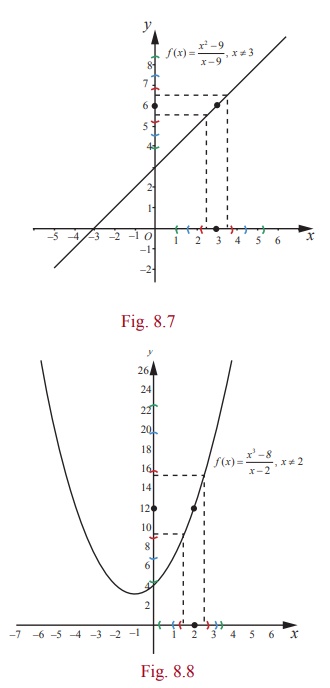Functions of Several Variables | Mathematics - Recall of Limit and Continuity of Functions of One Variable | 12th Maths : UNIT 8 : Differentials and Partial Derivatives
Chapter: 12th Maths : UNIT 8 : Differentials and Partial Derivatives
Recall of Limit and Continuity of Functions of One Variable
Recall of Limit
and Continuity of Functions of One Variable
Next we
shall look at continuity of a function of two variables. Before that, it will
be beneficial for us to recall the continuity of a function of single variable.
We have seen the following definition of continuity in XI Std.
A
function f : (a, b) ŌåÆ
ŌäØ is said to be continuous at a point
x0 Ōłł(a,
b) if the following hold:
(1) f is defined at x0 .
(2)
lim x ŌåÆx0 f (x)
= L exists
(3) L = f(x0)
The key
idea in the continuity lies in understanding the second condition given above.
We write lim x ŌåÆx0
f (x) = L
whenever the value f ( x) gets closer and closer to L as x
gets closer and closer to x0.
To make
it clear and precise, let us rewrite the second condition in terms of
neighbourhoods. This will help us when we talk about continuity of functions of
two variables.
Definition 8.5 (Limit
of a Function)
Suppose that f : (a, b)
ŌåÆ ŌäØ and x0 Ōłł(a, b) . We say that f has a limit L at x = x0 if for
every neighbourhood (L ŌłÆ ╬Ą , L + ╬Ą ), ╬Ą > 0 of L
, there xists a neighbourhood ( x0
ŌłÆ ╬┤ , x0 + ╬┤ ) ŌŖé ( a , b), ╬┤ > 0 of x0
such that
f( x) Ōłł ( L ŌłÆ ╬Ą , L + ╬Ą ) whenever x Ōłł ( x0 ŌłÆ╬┤ , x0 + ╬┤ ) \ {x0 } .
The
above condition in terms of neighbourhoods can also be equivalently stated
using modulus (or absolute value) notation as follows:
Ōł©
╬Ą > 0, Ōłā ╬┤ > 0 such that | f (x) - L | < ╬Ą whenever
0 < | x ŌłÆ x0 | < ╬┤ .
This
means whenever x ŌēĀ
x0 and is within ╬┤ distance from x0 , then f ( x) is within ╬Ą distance from L . Following figures explain the
interplay between ╬Ą
and ╬┤ .

We also
know, from XI Std, that a function f defined
in the neighbourhood of x0 except possibly at x0 has a limit at x0
if the following hold :
(1) lim
x ŌåÆx0+ f (x) = L1 (right
hand limit) exists
(2) limx ŌåÆx0ŌłÆ f (x) = L2 (left hand limit)
exists
(3) L1
= L2.
Let f (x0) = L (say). Then the
function f is continuous at x= x0
if L = L1 = L2 .Note that in the limit and continuity of
a single variable functions, neighbourhoods play an important role. In this
case a neighbourhood of a point x0
Ōłł ŌäØ looks like ( x0 ŌłÆ r,
x0 +
r) , where r > 0 . In order to develop limit and
continuity of functions of two variables, we need to define neighbourhood of a
point (u , v) Ōłł
ŌäØ2. So, for (u , v) Ōłł ŌäØ2 and r > 0 , a r -neighbourhood of the point (u
, v) is the set
Br ((u, v )) = {( x, y ) Ōłł ŌäØ2 | ( x ŌłÆ u )
2 + ( y ŌłÆ v )
2 < r2 }.
So a r -neighbourhood of a point (u , v)
is an open disc with centre (u , v) and radius r > 0 . If the centre is removed from
the neighbourhood, then it is called a deleted neighbourhood.
Related Topics